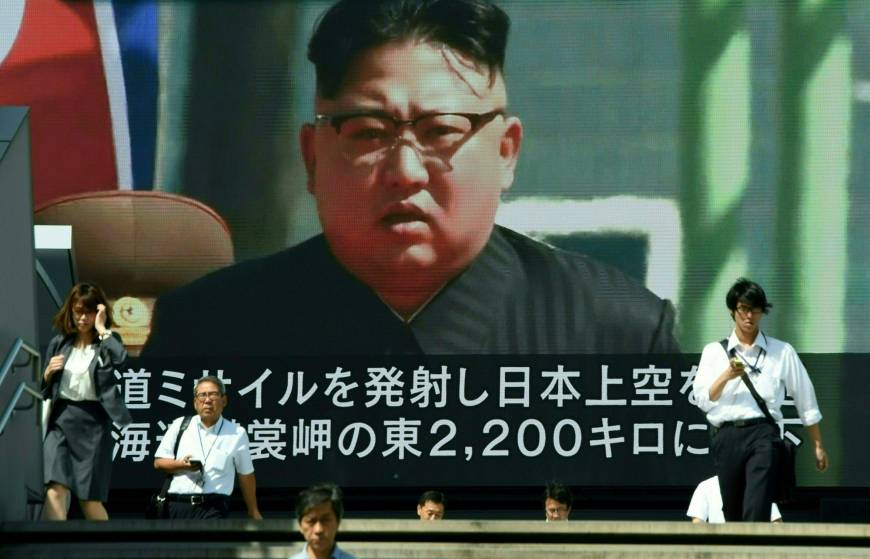
Take cover in a sturdy building or get underground.
That’s the emergency advice given to people in Japan in the event of a North Korean missile strike.
But there are two big problems: most Japanese homes are made of wood and lack a basement. In the countryside, there is often no building made of concrete.
And with only a matter of minutes from launch to impact, there’s simply no time to take cover.
As North Korea this week fired its second missile over Japan in less than a month and threatened to “sink” the country into the sea with nuclear weapons, many Japanese feel a sense of helplessness in the face of the threat from Pyongyang.
Sushi chef Isamu Oya, 67, who runs a restaurant in the small fishing town of Erimo, right under the flight path of Friday’s missile, summed up the feelings of many.
“The government told us to take cover in a stable building or underground, but there isn’t one here. We have no choice but just do nothing.
“Scary? Yes, but we can’t help it.”
Japan is one of the most seismically active countries in the world and also prone to extreme weather events, so citizens are well-drilled in emergency evacuation, and the authorities have a slick — if not infallible — warning system in place.
When the missile was detected, the J-Alert system immediately kicked in, warnings blared from loudspeakers, regular TV programming was interrupted and text messages sent to every mobile phone in some areas.
Local authorities and schools regularly stage drills to prepare residents in the event of a big earthquake and this year many exercises included practicing how to take cover if a missile is launched.
South Koreans have lived under the threat of attack from the North for decades, and are renowned for their phlegmatic attitude to its provocations.
When Seoul holds its regular civil defense exercises, officials often struggle to usher citizens into the underground shelters that are spread throughout the country.
Life carried on as usual in Seoul on Friday, and while the stock market initially fell on news of the missile test, within a few hours it was in positive territory.
“For me, it’s just business as usual,” said former businessman Noh Suk-won, 60. “The North is flexing its military muscle to force the U.S. to engage in negotiations. It’s not going to throw missiles on our heads.”
But polls show the Japanese are far from blase about the threat.
In a survey published last week by public broadcaster NHK, more than half (52 percent) of the respondents said they were “very worried” and around a third said they were “worried to some extent.”
Only two percent of those polled said they were “not worried at all.”
Machiko Watanabe, 66, a former office worker, said she was “scared about it every day.”
“I don’t think there is any way to protect yourself. The government and experts say ‘curl yourself in a ball’ and things like that. But there’s no way you can survive.”
With the threat growing and missiles becoming an all-too-frequent wake-up call, Japan is seeking to beef up its defenses.
The Defense Ministry has requested its largest-ever annual budget, seeking to develop systems to intercept simultaneous missile launches and to add a land-based Aegis missile defense system to complement its sea-based system.
But some are taking matters into their own hands.
Shelter maker Oribe Seiki Seisakusho, based in the western city of Kobe, has reported a healthy increase in demand given the recent tensions on the Korean peninsula.
“With the North Korean situation as it is, and with the J-alert ringing, people don’t know where to escape to,” said Nobuko Oribe, an executive at the firm.
Demand is mainly coming from “families who are building new houses and small business owners who want to build shelters for their employees near their factories or offices.”
However, a shelter is not an option for the masses. It takes four months to build and costs a hefty ¥25 million ($226,000) for a unit to keep 13 people safe.
On the streets of Tokyo, some were carrying on regardless.
Ken Tanaka, a 21-year-old freelance web designer, said he “didn’t care” about the launch, believing that the capital and its 14 million people would be safe in the event of a North Korean attack.
“I don’t think North Korea would dare to attack Tokyo and the capital area. I’m not thinking about it very much as a Tokyo resident,” he said. “I’m 21 years old and it doesn’t seem real to me.”
Comments
Post a Comment